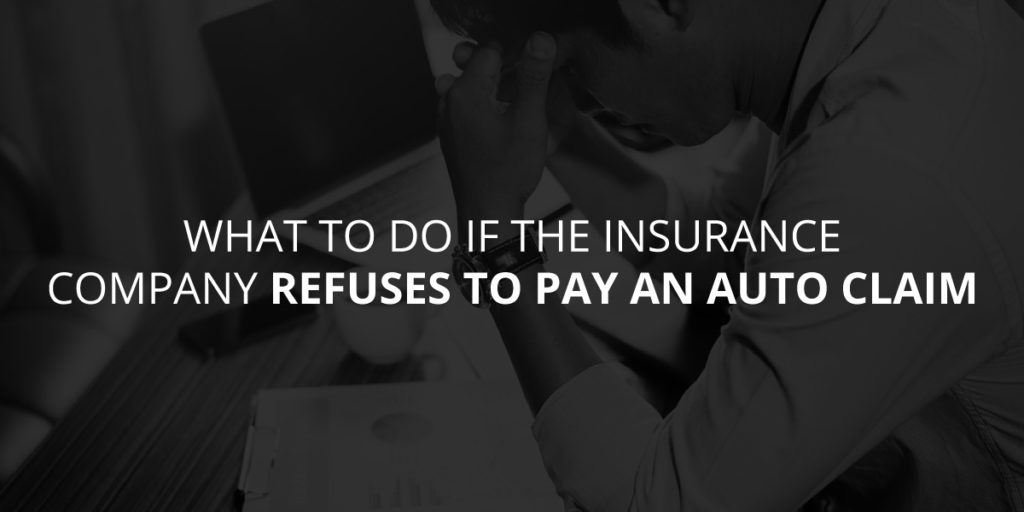
Just about everyone is involved in a car accident at some point in their lives, and your specific accident case may have been caused by your own negligence or the negligence of another driver. In the instance that it was another driver’s fault, it’s their insurance company that should cover your injury costs, and compensate you for car repairs or a replacement car of similar value.
But there frequently are unfortunate scenarios in which an individual has a valid auto claim, but the other driver’s insurance company refuses to pay for it. In these situations, it’s imperative to get involved with an experienced auto insurance lawyer, and our team at Siler & Ingber, LLP has handled countless cases of refused claims.
We know exactly how insurance companies are motivated towards compensatory action, as well as their tactics to slowly settle or decline payments altogether. By working with one of our auto insurance specialists we’ll be able to protect your rights against shady adjusters and ultimately resolve your auto claim.
In this article, we are going to go over some of the ways in which we work with our clients to resolve their claims, and the key aspects of these situations you should know about.
Profits Over People
The very first thing people should realize in the situation when an auto insurance company refuses to pay an auto claim is that insurance companies solely work for a profit.
They are never going to put people or altruism in general ahead of their bottom line, and by understanding how insurance companies work you can in turn correctly retaliate to any type of payment refusal.
All insurance companies will do just about anything to keep their money in certain types of investments instead of paying out claims, and they’ll only actually respond in these types of situations via profit-loss punishments.
Once you begin to fully understand their business methodology you can then figure out how to go forward with handling their tactics to refuse your auto claim.
Ask for an Explanation
Most insurance companies will always support their policyholder, so in the situation in which you were involved in an accident that wasn’t your fault you could many times find out that an insurance provider will not even begin to help you until they hear their policyholder’s version of what happened.
When the company denies the auto claim even though there’s evidence that you weren’t at fault, you’ll have to directly contact them and provide all the evidence you have. This type of evidence can include things like the police report, recorded statements and eyewitness testimonies that support you.
If you still cannot make any type of progress with the insurance company then you should ask (and record) them to explain how they believe the accident happened.
Threatening Their Profits
We’ve discussed how insurance companies put profits over people, so it makes sense that you’ll have to threaten their profits in some way when they refuse to pay an auto claim in order to get a response from them.
In order to effectively put their profits at risk, you’ll need the assistance of an experienced insurance lawyer, which is where we come in. What we’ll end up doing is give the insurance company all the necessary documents that will help them fairly evaluate the auto claim, and then set a very firm payment deadline.
When you threaten their profits you’ll likely motivate them to pay the full value of your auto claim, and this is predominately because they don’t want to deal with insurance lawyers and the time and money it takes to actually evaluate your auto claim.
Utilize Your Policy
There are circumstances in which your own insurance provider will compensate you for damages when another driver’s insurer isn’t willing to cooperate, and this predominately applies to having collision coverage. If your policy does have collision coverage included then your insurer should more than likely be able to fully pay out the claim when things get a little tricky.
When this kind of situation occurs your insurance company will then undergo subrogation, which is their process of recovering some or all of the claim’s expenses from the other driver’s insurer.
Mediation and Small Claims Court
It may depend on where you live, but if your auto claim amount is somewhat small then you’ll have the option to take the uncooperative insurance provider to small claims court for a solution. It’s always best to have an attorney on your side throughout this entire process to ensure everything goes smoothly during the mediation process in which a third party will hear both sides of the case and make a decision.
Filing a Lawsuit Over an Auto Claim
It may come down to you and your attorney resorting to filing a lawsuit against the insurance company in order to get your rightful compensation, and this process always requires the hiring of an experienced insurance lawyer.
The specialists at Siler & Ingber, LLP are more than capable of getting you to a favorable settlement or judgment by presenting your valid case in court, and by getting in touch with us shortly after your accident you can be rest assured that you are meeting all of New York’s statute of limitations and other document filing requirements.
Contact Us Today for a Free Consultation
If you or a loved one is dealing with an insurance company that is unwilling to pay out an auto claim that’s derived from an accident that wasn’t your fault, you are more than likely eligible to file a lawsuit to get your rightful compensation.
As we’ve discussed above it’s much more complicated than simply filing a lawsuit right away, and by joining forces with our team of respected insurance attorneys you’ll be in a much better position to put the right type of professional pressure on insurance companies and their adjusters to get the results you deserve. Contact us online or call us at 516.294.2666 for a free consultation.

The Impact Of Marijuana Legalization
Would New York legalizing recreational marijuana increase road accidents? We took a look at the stats in our latest study.
View StudyThe Law Office of Siler & Ingber, LLP
Phone:
1.516.294.2666
Address:
301 Mineola Blvd. Mineola, NY 11501
Subscribe to our Newsletter
SubscribeThis is a unique website which will require a more modern browser to work!
Please upgrade today!

